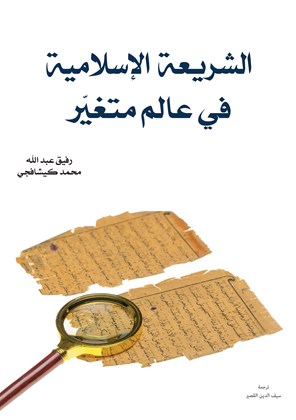al-sharīʿa al-Islāmiyya fī ʿālam mutaghayyir الشريعة الإسلاميّة في عالم متغيّر
Saqi Books
This is an Arabic translation of Understanding Sharia: Islamic Law in a Globalised World.
Description from Understanding Sharia
Sharia has been a source of misunderstanding and misconception in both the Muslim and non-Muslim worlds. Understanding Sharia: Islamic Law in a Globalised World sets out to explore the reality of sharia, contextualising its development in the early centuries of Islam and showing how it evolved in line with historical and social circumstances. The authors, Raficq S. Abdulla and Mohamed M. Keshavjee, both British-trained lawyers, argue that sharia and the positive law flowing from it, known as fiqh, have never been an exclusive legal system or a fixed set of beliefs.
In addition to tracing the history of sharia, the book offers a critique concerning its status today. Sharia is examined with regard to particular issues that are of paramount importance in the contemporary world, such as human rights; criminal penalties, including those dealing with apostasy, blasphemy and adultery, commercial transactions, and bio-medical ethics, amongst other subjects. The authors show that sharia is a legal system underpinned by ethical principles that are open to change in different circumstances and contexts, notwithstanding the claims for 'transcendental permanence' made by Islamists. This book encourages new thinking about the history of sharia and its role in the modern world.
Description in Arabic
يهدف هذا الكتاب إلى استكشاف حقيقة الشريعة وبيان تطورها بالتوافق مع الظروف التاريخية والاجتماعية. ويجادل المؤلفان بأن الشريعة والقانون الوضعي المُستمد منها، المعروف بالفقه، لم يُشكّلا أبداً نظاماً قانونياً خالصاً ولا حتى مجموعة ثابتة من المعتقدات. إنها مدعومة بمبادئ أخلاقية ومنفتحة على التغيير في ظروف وسياقات مختلفة. كما يُقدم الكتاب نقداً لوضع الشريعة اليوم، ويدرس علاقتها بقضايا محددة تتصف بأهمية بالغة في العالم المعاصر مثل حقوق الإنسان والعقوبات الجزائية، بما فيها الردة والتجديف والزنا والتعاملات التجارية وأخلاقيات الطب الحيوي.
Contents from Understanding Sharia
Preface and Acknowledgements
Introduction: Islamic Law in the Contemporary World
1. Sharia – Origin through Revelation, Historical Development and Change
2. Legal Practice under the Umayyads
3. Consolidation of the Schools of Law under the Abbasids
4. Developments after Shafi‘i
5. Further Geographical Expansion and Cultural Accommodation
6. Call for Reform – from Tanzimat to the Arab Spring
7. Shi‘i Legal Understanding and Theory of Law
8. The Multiple Manifestations of Sharia
9. Neo-Ijtihad
10. Sharia and Human Rights
11. Criminal Justice in Islam
12. Islam and Ethics
13. Critique
Glossary
Notes
Bibliography
Index
Raficq Abdulla is a South African-born lawyer, writer, public speaker and broadcaster who read Jurisprudence at Oxford. He was called to the Bar at the Middle Temple in the 1960s. He is currently a Visiting Fellow of the Faculty of Business and Law, Kingston University. He is also a founder member of the Advisory Panel of the Muslim Law Shariah Council (United Kingdom). He is a trustee of the Poetry Society, Planet Poetry and of PEN. In 1999, he was awarded an MBE for his interfaith work among Muslims, Jews, and Christians.
Mohamed Keshavjee is a South African-born lawyer called to the Bar at Gray’s Inn in 1969. He completed his LLM at London University and his PhD at SOAS with a focus on Islamic Law and Alternative Dispute Resolution (ADR). He has practised law in Kenya, Canada and the United Kingdom. His first book, Islam, Sharia and Alternative Dispute Resolution deals with how Muslims engage with sharia, customary practices and the laws of the United Kingdom. He has spoken on ADR at conferences in Europe, North America and Asia, and has trained family mediators in the EU countries and imams and pastors in mosque and church conflicts in the UK and the USA, respectively. In 2016, he was awarded the ‘Gandhi, King, Ikeda Peace Award’ at the Martin Luther King Jr. International Chapel, Morehouse College in Atlanta, Georgia, for his work on peace and human rights education.

